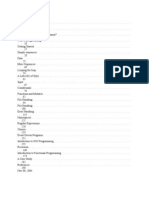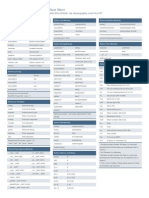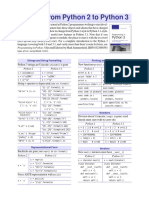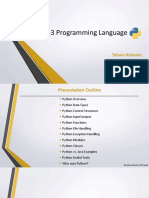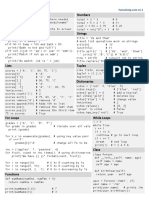Python CheatSheet PDF
Uploaded by
Tareq MufaddiPython CheatSheet PDF
Uploaded by
Tareq MufaddiPython TunnelsUp.com v1.
1
General Information Numbers
Whitespace matters! Indent where needed. total = 3 * 3 # 9
Import modules with "import modulename" total = 5 + 2 * 3 # 11
# This is a comment cost = 1.50 + 3.75 # 5.25
print("Hello, World!") # prints to screen total = int("9") + 1 # 10
Conditional Statements Strings
if isSunny: title = 'Us and them'
print('It's sunny!') # most list operations work on strings
elif 90 <= temp < 100 and bath > 80: title[0] # 'U'
print('Bath is hot and full!') len(title) # 11
elif not ((job == 'qa') or (usr == 'adm')): title.split(' ') # ['Us', 'and', 'them']
print('Match if not qa or adm') ':'.join(['A','B','C']) # 'A:B:C'
else: nine = str(9) # convert int to string
print('No match. Job is ' + job) title.replace('them', 'us') # Us and us
Lists Tuples
scores = ['A', 'C', 90, 75, 'C'] Like lists, except they cannot be changed
scores[0] # 'A' tuple1 = (1,2,3,"a","z") # Creates tuple
scores[1:3] # 'C', 90 tuple1[3] # 'a'
scores[2:] # 90, 75, 'C' Dictionaries
scores[:1] # 'A'
scores[:-1] # 'A', 'C', 90, 75 votes = {'red': 3, 'blue': 5}
len(scores) # 5 votes.keys() # ['blue', 'red']
scores.count('C') # 2 votes['gold'] = 4 # add a key/val
scores.sort() # 75, 90, 'A', 'C', 'C' del votes['gold'] # deletes key
scores.remove('A') # removes 'A' votes['blue'] = 6 # change value
scores.append(100) # Adds 100 to list len(votes) # 2
scores.pop() # removes the last item votes.values() # [6, 3]
scores.pop(2) # removes the third item 'green' in votes # False
75 in scores # True votes.has_key('red') # True
For Loops While Loops
grades = ['A', 'C', 'B', 'F'] i = 0
for grade in grades: # iterate over all vals while True:
print (grade) i += 1
if i == 3:
for k,v in enumerate(grades): # using key value pair continue # go to next loop
if v=='F': if i == 7:
grades[k]='A' # change all Fs to As break # end loop
print(i) # 1 2 4 5 6
inv = {'apples': 7, 'peaches': 4} Class
for fruit, count in inv.items(): # using dictionaries
class Person:
print("We have {} {}".format(count, fruit))
def __init__(self, name, age):
self.name = name
for i in range(10): # 0 to 9 counting by 1s
self.age = age
for i in range(5, 10): # 5 to 9 counting by 1s
for i in range(9, 2, -1): # 9 to 3 decreasing by 1s
def birthYear(self):
Functions return year - self.age
def sumNums(numOne, numTwo = 0):
return numOne + numTwo user = Person('Jimmi', 27)
user.name = 'Jim'
print(sumNums(3,4)) # 7 print(user.name) # prints Jim
print(sumNums(3)) # 3 print(user.birthYear())
You might also like
- Flask: The Cheat Sheet: Flask For Django UsersNo ratings yetFlask: The Cheat Sheet: Flask For Django Users1 page
- Risk Management For Prop Firm Traders A Step by Step GuideNo ratings yetRisk Management For Prop Firm Traders A Step by Step Guide12 pages
- 12 Comp Sci 1 Revision Notes Pythan Advanced ProgNo ratings yet12 Comp Sci 1 Revision Notes Pythan Advanced Prog5 pages
- Python Cheat Sheet: Pandas - Numpy - Sklearn Matplotlib - Seaborn BS4 - Selenium - Scrapy100% (4)Python Cheat Sheet: Pandas - Numpy - Sklearn Matplotlib - Seaborn BS4 - Selenium - Scrapy11 pages
- Python Cheat Sheet: Conditional Tests (Comparisons)No ratings yetPython Cheat Sheet: Conditional Tests (Comparisons)2 pages
- Python 3 Beginner's Reference Cheat Sheet: by Via100% (1)Python 3 Beginner's Reference Cheat Sheet: by Via1 page
- Basic Data Structures Keywords: Types Evaluate To FalseNo ratings yetBasic Data Structures Keywords: Types Evaluate To False7 pages
- Begginer's Python Cheat Sheet-Essentials PDFNo ratings yetBegginer's Python Cheat Sheet-Essentials PDF2 pages
- Beginners Python Cheat Sheet PCC ClassesNo ratings yetBeginners Python Cheat Sheet PCC Classes2 pages
- Python3 Data Structures Cheat Sheet: by ViaNo ratings yetPython3 Data Structures Cheat Sheet: by Via1 page
- Python3 Programming Language: Tahani Almanie100% (1)Python3 Programming Language: Tahani Almanie57 pages
- Beginning Programming With Python For Dummies (Mueller 2014-09-22)No ratings yetBeginning Programming With Python For Dummies (Mueller 2014-09-22)34 pages
- Python Cheat Sheet: Print Print ("Hello World") Input Input ("What's Your Name")100% (1)Python Cheat Sheet: Print Print ("Hello World") Input Input ("What's Your Name")16 pages
- Python Types Branching Functions: If Def ReturnNo ratings yetPython Types Branching Functions: If Def Return1 page
- Python Interview Questions and Answers For 2019 - IntellipaatNo ratings yetPython Interview Questions and Answers For 2019 - Intellipaat25 pages
- Python-Programming-Exercises - 100+ Python Challenging Programming Exercises100% (2)Python-Programming-Exercises - 100+ Python Challenging Programming Exercises33 pages
- Tkinter GUI Application Development Blueprints: Master GUI programming in Tkinter as you design, implement, and deliver 10 real-world applicationsFrom EverandTkinter GUI Application Development Blueprints: Master GUI programming in Tkinter as you design, implement, and deliver 10 real-world applicationsNo ratings yet
- 311302-BASIC MATHEMATICS (K-Scheme-Syllabus)No ratings yet311302-BASIC MATHEMATICS (K-Scheme-Syllabus)8 pages
- 7 Effective Classroom Management in Physical Education 6No ratings yet7 Effective Classroom Management in Physical Education 610 pages
- Immediate download Advanced Construction Mathematics 1st Edition Surinder S. Virdi ebooks 2024100% (2)Immediate download Advanced Construction Mathematics 1st Edition Surinder S. Virdi ebooks 202455 pages
- (Ebooks PDF) Download Chemical Physics of Molecular Condensed Matter Kazuya Saito Full Chapters100% (4)(Ebooks PDF) Download Chemical Physics of Molecular Condensed Matter Kazuya Saito Full Chapters52 pages
- Use of Silica Sand As Fine Material in C PDFNo ratings yetUse of Silica Sand As Fine Material in C PDF7 pages
- ENC222-0375 - 2020 - BIKENDI - JUMA - HUDNUT - Final WriteUPNo ratings yetENC222-0375 - 2020 - BIKENDI - JUMA - HUDNUT - Final WriteUP14 pages
- How to write Data Interpretation in EnglishNo ratings yetHow to write Data Interpretation in English7 pages
- The Importance of Saving Habits in Terms of EconomyNo ratings yetThe Importance of Saving Habits in Terms of Economy2 pages
- Sustainable Mobility in Metropolitan Regions Insights from Interdisciplinary Research for Practice Application 1st Edition Gebhard Wulfhorst - Quickly download the ebook to explore the full content100% (1)Sustainable Mobility in Metropolitan Regions Insights from Interdisciplinary Research for Practice Application 1st Edition Gebhard Wulfhorst - Quickly download the ebook to explore the full content45 pages
- Mini Project Report Natural Dyes For The Applicationn of Dye Sensitized Solar Cell 2019-20No ratings yetMini Project Report Natural Dyes For The Applicationn of Dye Sensitized Solar Cell 2019-2030 pages
- Wildlife Habitat Conservation Concepts Challenges and Solutions 1st Edition Michael L. Morrison - Download the full set of chapters carefully compiled100% (2)Wildlife Habitat Conservation Concepts Challenges and Solutions 1st Edition Michael L. Morrison - Download the full set of chapters carefully compiled47 pages
- Partial Differential Equations (Week 2) First Order Pdes: Gustav Holzegel January 24, 2019No ratings yetPartial Differential Equations (Week 2) First Order Pdes: Gustav Holzegel January 24, 201916 pages
- WEAVING FABRICA AND RATIOCINATIO An InquNo ratings yetWEAVING FABRICA AND RATIOCINATIO An Inqu12 pages
- National Institute For Small Industry Extension and TRAINIG (Nisiet)No ratings yetNational Institute For Small Industry Extension and TRAINIG (Nisiet)14 pages
- Abrencillo, Angel Alcaide, Mica Aquino, Miles Aranilla, Vea Arpon, Jessica Asistin Rose AnnNo ratings yetAbrencillo, Angel Alcaide, Mica Aquino, Miles Aranilla, Vea Arpon, Jessica Asistin Rose Ann11 pages
- Parental Anxiety Societal Influences and the Fear of Judgment in Parenting (1)No ratings yetParental Anxiety Societal Influences and the Fear of Judgment in Parenting (1)18 pages




























